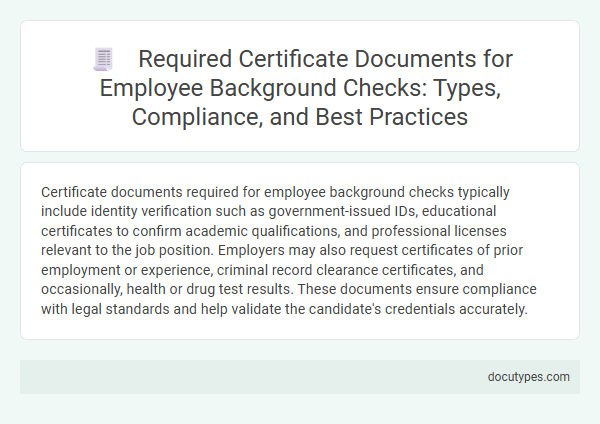Certificate documents required for employee background checks typically include identity verification such as government-issued IDs, educational certificates to confirm academic qualifications, and professional licenses relevant to the job position. Employers may also request certificates of prior employment or experience, criminal record clearance certificates, and occasionally, health or drug test results. These documents ensure compliance with legal standards and help validate the candidate's credentials accurately.
Introduction to Certificate Requirements for Employee Background Checks
Employee background checks require specific certificate documents to verify identity, qualifications, and legal compliance. Commonly requested certificates include educational diplomas, professional licenses, and criminal record clearances. Understanding these certificate requirements ensures your background check process is smooth and accurate.
Importance of Certificate Documentation in Employment Screening
Certificate documents play a crucial role in employee background checks by verifying a candidate's educational qualifications and professional credentials. These documents help employers assess the authenticity of the applicant's skills and qualifications, ensuring compliance with industry standards. Proper certificate documentation reduces hiring risks and supports a trustworthy recruitment process.
Common Types of Certificates Needed for Background Checks
| Certificate Type | Purpose | Details |
|---|---|---|
| Educational Certificates | Verify academic qualifications | Includes diplomas, degrees, and transcripts to confirm the employee's educational background. |
| Professional Certifications | Validate job-related skills | Documents like licenses, trade certificates, or professional memberships relevant to the role. |
| Identity Certificates | Confirm personal identity | Government-issued documents such as passports, national ID cards, or social security certificates. |
| Criminal Clearance Certificates | Ensure no criminal record | Background checks often require certificates from police departments or other authorities stating the absence of criminal history. |
| Employment Verification Certificates | Confirm previous employment | Documents that verify prior job roles, duration of employment, and performance from previous employers. |
| Health and Medical Certificates | Ensure fitness for work | Certificates issued by medical professionals confirming the employee's health status. |
Your employer or background screening agency may request these certificates to conduct a thorough employee background check.
Educational Certificate Verification Process
Certificate documents required for employee background checks primarily include educational certificates, professional licenses, and training certifications. These documents confirm the authenticity of the candidate's claimed qualifications and skills.
The educational certificate verification process involves validating the degree or diploma directly with the issuing institution. You should ensure that the certificate details such as the institution name, issue date, and qualification match the candidate's records for accuracy.
Professional License and Certification Checks
Professional license and certification checks are critical for verifying the credentials of employees in regulated industries. These documents ensure candidates meet legal and professional standards required for their roles.
- Professional License Verification - Confirms the authenticity and current status of licenses issued by regulatory bodies.
- Certification Documentation - Validates specialized training and qualifications relevant to the job position.
- Expiry and Renewal Records - Checks ensure licenses and certifications are valid and up-to-date, preventing compliance risks.
Identity Proof Certificates: Key Requirements
What certificate documents are essential for verifying an employee's identity during background checks? Identity proof certificates such as government-issued ID cards, passports, and driver's licenses serve as primary verification documents. These certificates must be valid, clear, and unexpired to ensure accurate confirmation of identity.
Legal and Regulatory Compliance for Certificate Documentation
Certificate documents play a crucial role in verifying employee credentials during background checks. Ensuring legal and regulatory compliance for certificate documentation protects your company and maintains hiring integrity.
- Educational Certificates - Confirm academic qualifications and accreditation status to meet industry standards.
- Professional Licenses - Verify licensure validity required for certain regulated professions to comply with legal requirements.
- Criminal Background Certificates - Provide evidence of legal clearance or criminal record checks mandated by law for employment eligibility.
Best Practices in Collecting and Verifying Certificates
Certificate documents play a crucial role in employee background checks by validating qualifications and professional credentials. Proper collection and verification of these certificates ensure accuracy and compliance with hiring standards.
- Verify Authenticity - Cross-check certificates with issuing institutions or official registries to confirm their validity.
- Collect Relevant Certificates - Focus on educational, professional licenses, and any industry-specific certificates related to the job role.
- Maintain Confidentiality - Handle all certificate documents securely to protect employee privacy and sensitive information.
Your thorough approach in collecting and verifying certificates strengthens the reliability of the background check process.
Challenges and Solutions in Certificate Document Management
Certificate documents required for employee background checks typically include educational degrees, professional licenses, and training certifications. These documents verify qualifications and ensure compliance with industry standards.
Managing certificate documents presents challenges such as verifying authenticity, preventing forgery, and maintaining up-to-date records. Lost or expired certificates can delay hiring processes and compromise security. Implementing digital certificate management systems and secure verification protocols offers effective solutions to these issues, enhancing accuracy and efficiency.
What Certificate Documents Are Required for Employee Background Checks? Infographic

